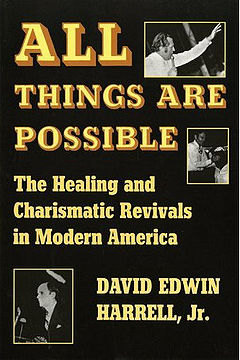O. L. Jaggers in All Things are Possible
| All Things are Possible | |
|---|---|
 | |
| Author | David Edwin Harrell, Jr. |
| Publisher | Indiana University Press |
| Publication date | January 22, 1979 |
| ISBN | 9780253202215 |
O. L. Jaggers
Another talented and successful leader of the revival who chose ultimately to establish a firm church base instead of remaining an itinerant evangelist was O. L. Jaggers. Jaggers whose father was an Assemblies of God minister, began revivalistic work in 1941. He attended one of the early Branham campaigns in Arkansas, saw the potential of union meetings, and began holding auditorium revivals immediately. He soon was one of the leading figures in the Voice of Healing group.
Jaggers held successful meetings throughout the country, but in 1952 he settled down and became pastor of the World Church in Los Angeles. Jaggers called the "phenomenal rise and growth" of his church "the most remarkable success story of the 20th century." In 1956 he announced that the church had a membership over 10,000 and that "additional applications have also been submitted for membenhip which have not been passed upon." At that time the church had a seating capacity of 3,000 and Jaggers' plans were grandiose:
- Plans are now being pushed forward for the New World Church, the magnificence of which has never been equaled in the history of the world. This new structure will have a seating capacity of ten thousand... However, God has subsequently spoken to Brother Jaggers and told him that the membership of the World Church in Los Angeles alone will be more than one hundred thousand!
Jaggers was probably the most erratic and extreme of all the early revivalists. His contemporaries considered him a tremendous preacher, many believed him the greatest of the revival. But they also saw in him many of the chronic weaknesses which plagued the movement at its end. He was, according to one contemporary, "a man exceedingly full of pride." Gordon Lindsay, and others associated with the Voice of Healing, became more and more skeptical of the exaggerated reports sent in by Jaggers and feared that frequently "his imagination went wild." Lindsay later recalled: "On the radio he would say, letters are coming in by the hundreds of thousands, by the millions and things like that." Lindsay recalled that Jaggers claimed, after appearing as a speaker at a Voice of Healing convention, that "supernaturally he had been on television all over the United Stales." Lindsay retorted that "no such thing happened." An open feud disrupted the supporters of the healing revival in California until a compromise was effected between the two men by Demos Shakarian. Jaggers was also accused of loving expensive living. In 1958, the Los Angeles press charged that he was living in a parsonage valued at $390,000 and that he drove an $11,000 automobile.
By the mid-1950's Jaggers found himself estranged from organized pentecostalism and even from many of his fellow evangelists. Nothing came of his 1956 plan to organize the leading healing evangelists; he urged that they "get together" in his World Fellowship. Extremely acid in his criticisms of those who opposed his schemes, he set a style of anti-institutional invective otherwise approached only by A. A. Allen:
- Just as every move of God's Spirit in the past which is recorded in the page of every history has had its opposition and persecution so the World Church has beem attacked by the forces of evil which have included communism, the red conspiracy, ecclesiastical leaders, including full Gospel denominations whose ministry have met in closed sessions, scheming with their warped brains how they may destroy this tremendous church! All the opposition of Satan, however, to this time has been crushed under the feet of ten thousand members of the World Church.
Jaggers not only attacked the pentecostal churches but also some of the leading, figures in the revival.
By the time the revival began to decline in the late 1950's, O. L. Jaggers had abandoned healing revivalism. He had isolated himself from the mainstream of the movement, and his doctrinal views became more and more extreme. He readily accepted such controversial teachings as the flowing of miracle oil and had begun to teach that Christians could have eternal life on earth: "The first time in 1900 years," he wrote, "an exact formula has been given as to how to attain physical immortality in this World." The fountain of perpetual youth, longevity, and eternal life in a physical body, has now been discovered in this world." William Branham publicly urged Jaggers, "Come back and stay with the Gospel," but the strong-willed revivalist continued to go his own way. Since 1955, recalled one deliverance evangelist, "most of us have just sort of left him alone." By the mid-I970s the World Church had become only a shadow of its former glory, but O. L Jaggers was still its regular minister.[1]
References
- ↑ All Things are Possible. Indiana University Press. 1979. pp. 78-79. ISBN 9780253202215.